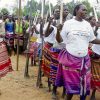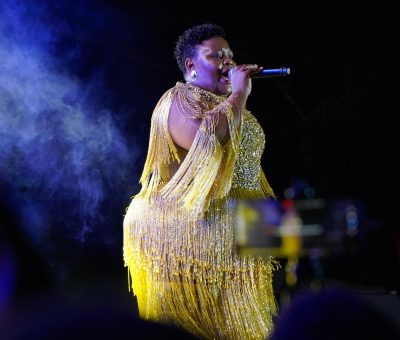It’s tough for women to get to the top in African politics – but we’re blazing a trail
Sub-Saharan Africa’s female representation in parliament outstrips that of the US, says the continent’s youngest female minister, as she marks the launch of the African Women Leaders Network
hen Ellen Johnson Sirleaf stands down later this year as president of Liberia, it will mean that for the first time in more than a decade, no African country will be led by a woman. While strong female leaders are still emerging to play a critical role in African politics, it is a reminder that we cannot take our foot off the pedal.
I know from first-hand experience how tough it can be for African women to win the top political positions. I’m the youngest woman in the Ugandan government and the youngest female minister in Africa.
In Uganda and across Africa as a whole, women are the backbone of society and the economy. The continent is dominated by small-scale farming and “informal” traders, close to 80% of whom are women and are often the sole providers for their families. Yet, despite our central role shouldering this economic and social burden, we often struggle to gain a seat at the decision-making table.
The African Women Leaders Network, which launched in June, aims to help, supporting the role of women in leadership across Africa. The network, backed by the UN and African Union, will provide practical, grassroots training and mentoring for women trying to reach leadership posts traditionally held by men. It will also be a meeting place for ideas and people from across the continent.
But do not forget that we African women start from a position of strength. Before rushing to criticise Africa – as though we are one single country – for lacking democracy and for low female participation, observers should recognise the progress already made. Women occupy only 24% of parliamentary and ministerial seats across sub-Saharan Africa. However, this far outstrips the percentage of female representation in developed countries such as the United States, where less than 20% of congressional seats are held by women, or Japan where fewer than 10% of legislators are female.
Some African countries are in fact trailblazers in the promotion of women’s leadership. Rwanda, for example has the highest female representation in the world: 61% of its MPs are women. South Africa has well over 40% parliamentary representation by women. A further seven African countries have parliaments where more than 30% of their members are female. Uganda ranks 31st out of 195 countries globally, with 34% of our MPs being women. The UK, with 30% female representation, ranks 46th.
These changes have not happened by accident, but are the result of deliberate policy decisions and grassroots demand. In some cases, they came about through hard-fought constitutional amendments. At least 16 African countries already have parity legislation in place. Uganda and Kenya have led the way in reserving seats in parliament for women and young people’s representatives.Advertisementhttps://44bfcd2444fe7493be4a93e98263b795.safeframe.googlesyndication.com/safeframe/1-0-38/html/container.html
Through the use of these reserved seats, and quotas for female candidates, many African governments have taken legislative action to increase women’s participation, something most western governments have refused to do themselves.
Such measures have been a vital first step towards gender equality. However, top-down legal and constitutional changes are not enough on their own. To deliver lasting change, women must be provided with the practical skills they need to gain positions of power. The increase in the number of women in African politics is making a real difference to the lives of the people they represent. It is no coincidence, for instance, that countries with high numbers of women in politics led the way in achieving many of the millennium development goals, such as reducing maternal and infant mortality.
The truth is that in what has traditionally been a man’s world, African female parliamentarians and ministers must deliver on the trust their voters have shown them or face their wrath. Whether they have a reserved seat or not, non-performers of any gender do not survive long in politics. We are always accountable to the electorate. It is not uncommon for almost half of incumbent MPs to lose their seats at the ballot box in a Ugandan election – a much higher rate than in most western countries
Africa still has a long way to go and the progress is slow, but it is nonetheless real and sustained. I am confident that I will live to see the day when female presidents are as common across Africa as female MPs – and even perhaps when that is true in the west as well.
- Evelyn Anite, minister of finance for industrialisation and privatisation, Uganda
Lastest Stories

- Business
- at July 19, 2021



















